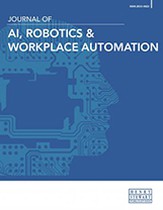Digital transformation with robo-advising and AI in asset management: A critical appraisal
Abstract
After the two revolutions in finance over the last century — the efficient market mathematical finance revolution in the 1950s and the behavioural finance revolution in the 1970s —now the third finance revolution with ‘machine finance’ has begun. Robo-advising combines artificial intelligence (AI) and financial expertise to offer accessible and personalised financial guidance. It analyses data, optimises portfolios and provides lower-cost investment strategies. Robo-advisors automate tasks such as portfolio rebalancing and offer efficiency and rational decision making; however, concerns regarding data privacy, algorithmic bias and regulations need attention. This paper explores the benefits, challenges and regulatory landscape of robo-advising. It emphasises the support robo-advisory services provide in minimising risk, generating returns and maintaining portfolios. They offer an efficient alternative to traditional advisors, using technology and expertise for personalised investment guidance. Further, the paper describes the fee structure of robo-advisors and the benefits they offer to financial advisors. It explains that traditional financial advisors typically charge fees ranging from 1 to 1.5 per cent of total assets managed, while robo-advisors charge between 0 and 0.25 per cent for basic services. The paper also explores the impact of fees on investment performance and introduces the concept of robo-advisors using index exchange-traded funds (ETFs) to minimise fees. It further explains the two main types of robo-advisors: hybrid and pure. Additionally, the paper provides examples of prominent robo-advisor providers and their assets under management. It concludes by highlighting the potential influence of AI on robo-advising, including data analysis, personalised recommendations and improved communication with investors.
The full article is available to subscribers to the journal.
Author's Biography
Jörg Orgeldinger , an accomplished international scientist, holds dual Master’s degrees in business administration/finance from Goethe University Frankfurt and Edinburgh Business School. He earned a PhD with honours from Leopold Franzius University and continues his education at top universities worldwide. Additionally, he completed a postgraduate diploma in telecommunication engineering from UC Berkeley and attended The Wharton School for business and finance. With over 17 years’ experience in finance, credit risk and business valuation, he has worked for prestigious institutions including McKinsey, UBS and HSBC. Jörg holds four professional licences in valuation and merger with NACVA, qualifying as an expert witness in US federal courts. He has authored numerous research papers and textbooks in finance and economics, published in renowned journals worldwide, and is active in professional organisations such as GARP and PRMIA.
